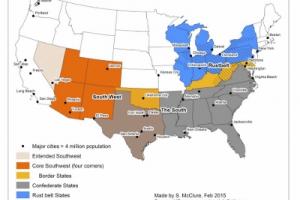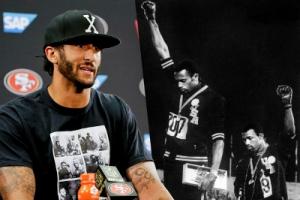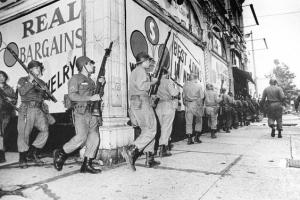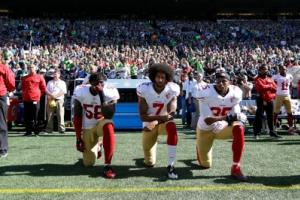Oakland Catcher Bruce Maxwell Breaks Baseball’s Politics Line
The Nation
 Frank Serpico, who testified against NYPD police corruption in 1972, joined more than 100 African American uniformed officers who demonstrated at a rally supporting NFL player Colin Kaepernick's objections to police abuse and inequality. "Kaepernick was not disrespecting the flag or our vets. I believe that Kaepernick was protesting a corrupt system of justice that allows some police to use excessive force, even the taking of innocent life, without consequences"
Frank Serpico, who testified against NYPD police corruption in 1972, joined more than 100 African American uniformed officers who demonstrated at a rally supporting NFL player Colin Kaepernick's objections to police abuse and inequality. "Kaepernick was not disrespecting the flag or our vets. I believe that Kaepernick was protesting a corrupt system of justice that allows some police to use excessive force, even the taking of innocent life, without consequences"
 The far right, racism, militarism, inequality, and poverty are all centered in the South. The majority of African Americans, the main protagonist of progressive politics in this country, live in the South. And the South has more electoral votes, battleground state votes, population, and congresspersons than any other region. The South is changing rapidly, giving rise to more progressive demographic groups - especially Black and Latino migrations...
The far right, racism, militarism, inequality, and poverty are all centered in the South. The majority of African Americans, the main protagonist of progressive politics in this country, live in the South. And the South has more electoral votes, battleground state votes, population, and congresspersons than any other region. The South is changing rapidly, giving rise to more progressive demographic groups - especially Black and Latino migrations...
 Colin Kaepernick, the former quarterback of the San Francisco 49ers, is being blackballed — itself a revealing phrase — from the National Football League with the collusion of the all-white owners. He is ostracized because a year ago he exercised his First Amendment right to free speech by taking a knee during the playing of the national anthem, as a symbol of protest against police shootings of unarmed African-American men.
Colin Kaepernick, the former quarterback of the San Francisco 49ers, is being blackballed — itself a revealing phrase — from the National Football League with the collusion of the all-white owners. He is ostracized because a year ago he exercised his First Amendment right to free speech by taking a knee during the playing of the national anthem, as a symbol of protest against police shootings of unarmed African-American men.
 As long as white children are constructed as innocent, we must continue to demand that children of color are as well. The idea of childhood innocence carries so much political force, we can’t allow it to be a whites-only club. We argue that black and brown children are as innocent as white children, we assume that childhood innocence is purely positive. The idea of childhood innocence itself is not innocent: It’s part of a 200-year-old history of white supremacy.
As long as white children are constructed as innocent, we must continue to demand that children of color are as well. The idea of childhood innocence carries so much political force, we can’t allow it to be a whites-only club. We argue that black and brown children are as innocent as white children, we assume that childhood innocence is purely positive. The idea of childhood innocence itself is not innocent: It’s part of a 200-year-old history of white supremacy.
 In the summer of 1967, the streets of Newark exploded in violence. Here is a first-hand account of the tragic events that changed the city, and the country forever. Newark’s population is still exceedingly low income. Crime, gang warfare, drugs, joblessness and failing schools are still facts of life in some Newark neighborhoods. But the cultures of many ethnic groups continue to lift the spirit of its many peoples. Increasingly, Newark is a good place to call home.
In the summer of 1967, the streets of Newark exploded in violence. Here is a first-hand account of the tragic events that changed the city, and the country forever. Newark’s population is still exceedingly low income. Crime, gang warfare, drugs, joblessness and failing schools are still facts of life in some Newark neighborhoods. But the cultures of many ethnic groups continue to lift the spirit of its many peoples. Increasingly, Newark is a good place to call home.
 The truth is ugly as sin. The NFL is denying Colin Kaepernick employment not because he isn’t “good enough” but because he is being shut out for the crime of using his platform to protest the killing of black kids by police. NFL owners don’t make pariahs out of players who beat women or face accusations of murder. Kaepernick’s pariah status is about sending a shot across the bow at every political athlete—particularly black athletes—that they better toe the line.
The truth is ugly as sin. The NFL is denying Colin Kaepernick employment not because he isn’t “good enough” but because he is being shut out for the crime of using his platform to protest the killing of black kids by police. NFL owners don’t make pariahs out of players who beat women or face accusations of murder. Kaepernick’s pariah status is about sending a shot across the bow at every political athlete—particularly black athletes—that they better toe the line.
 With all the toxicity coming out of the White House and the GOP-dominated Congress, it's important to remember how insufferable were the politics of the neoliberal Democrats in power under Bill Clinton. The book under review (an article derived from the book is below) should help us remember how malignant were the Clinton years when it came to economic and social justice.
With all the toxicity coming out of the White House and the GOP-dominated Congress, it's important to remember how insufferable were the politics of the neoliberal Democrats in power under Bill Clinton. The book under review (an article derived from the book is below) should help us remember how malignant were the Clinton years when it came to economic and social justice.
Spread the word